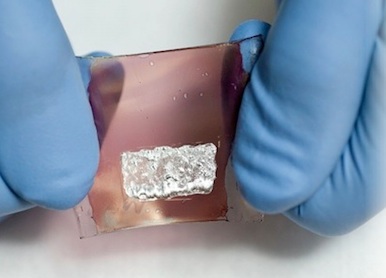Science Fiction
Dictionary
A B C D E F G H I J K L M N O P Q R S T U V W X Y Z
New Robot Skin Is Flexible, Sensitive, Solar-Powered

This amazing new skin for robots is built on a stretchable solar cell system that can expand and shrink along two different axes. When the skin is subjected to pressure, the current flowing through the transistors is modified as tiny pyramid shapes molded into the polymer layer compress, resulting in a super-sensitive transducer that can apparently detect the pressure from a house-fly's feet.

(Fast Company)
The latest advance has seen Bao adding a corrugated microstructure organic solar cell layer into the skin. The clever folding in this layer allows it to be stretched along two axes...by up to 30% beyond its original length. This lets her coat pretty much any human-like joint with the skin and still have it collect enough solar power to run its sensor array, even when the skin is stretched and distorted over complex joints like elbows. Cleverly, the flexible solar array is connected into a circuit via a liquid metal electrode, which conforms to the particular shape of the solar cell at any particular moment.
If robots are to work with people, they need to be as sensitive as people to unintended touches. If you want the robots of the future, you need super skin for robots.
Also, if you want your own surrogate android - like in the recent movie - you'll want sensitive skin.
Update 8-Dec-2011: In Roger Zelazny's Hugo award-winning 1966 novel This Immortal gives sf fans a glimpse of this idea. A wrestling robot uses special skin described as a radar mesentery to sense its opponent. End update.
Via Fast Company.
Scroll down for more stories in the same category. (Story submitted 2/23/2011)
Follow this kind of news @Technovelgy.| Email | RSS | Blog It | Stumble | del.icio.us | Digg | Reddit |
Would
you like to contribute a story tip?
It's easy:
Get the URL of the story, and the related sf author, and add
it here.
Comment/Join discussion ( 2 )
Related News Stories - (" Robotics ")
Atlas Robot Makes Uncomfortable Movements
'Not like me. A T-1000, advanced prototype. A mimetic poly-alloy. Liquid metal.' - James Cameron, 1991.
Humanoid Robots Tickle The Ivories
'The massive feet working the pedals, arms and hands flashing and glinting...' - Herbert Goldstone, 1953.
Golf Ball Test Robot Wears Them Out
"The robot solemnly hit a ball against the wall, picked it up and teed it, hit it again, over and again...' - Frederik Poh, 1954.
PaXini Supersensitive Robot Fingers
'My fingers are not that sensitive...' - Ray Cummings, 1931.
Technovelgy (that's tech-novel-gee!) is devoted to the creative science inventions and ideas of sf authors. Look for the Invention Category that interests you, the Glossary, the Invention Timeline, or see what's New.
Science Fiction
Timeline
1600-1899
1900-1939
1940's 1950's
1960's 1970's
1980's 1990's
2000's 2010's
Current News
The New Habitable Zones Include Asimov's Ribbon Worlds
'...there's a narrow belt where the climate is moderate.'
Can One Robot Do Many Tasks?
'... with the Master-operator all you have to do is push one! A remarkable achievement!'
Atlas Robot Makes Uncomfortable Movements
'Not like me. A T-1000, advanced prototype. A mimetic poly-alloy. Liquid metal.'
Boring Company Drills Asimov's Single Vehicle Tunnels
'It was riddled with holes that were the mouths of tunnels.'
Humanoid Robots Tickle The Ivories
'The massive feet working the pedals, arms and hands flashing and glinting...'
A Remarkable Coincidence
'There is a philosophical problem of some difficulty here...'
Cortex 1 - Today A Warehouse, Tomorrow A Calculator Planet
'There were cubic miles of it, and it glistened like a silvery Christmas tree...'
Perching Ambush Drones
'On the chest of drawers something was perched.'
Leader-Follower Autonomous Vehicle Technology
'Jason had been guiding the caravan of cars as usual...'
Golf Ball Test Robot Wears Them Out
"The robot solemnly hit a ball against the wall, picked it up and teed it, hit it again, over and again...'
Boring Company Vegas Loop Like Asimov Said
'There was a wall ahead... It was riddled with holes that were the mouths of tunnels.'
Rigid Metallic Clothing From Science Fiction To You
'...support the interior human structure against Jupiterís pull.'
Is The Seattle Ultrasonics C-200 A Heinlein Vibroblade?
'It ain't a vibroblade. It's steel. Messy.'
Roborock Saros Z70 Is A Robot Vacuum With An Arm
'Anything larger than a BB shot it picked up and placed in a tray...'
A Beautiful Visualization Of Compact Food
'The German chemists have discovered how to supply the needed elements in compact, undiluted form...'
Bone-Building Drug Evenity Approved
'Compounds devised by the biochemists for the rapid building of bone...'
